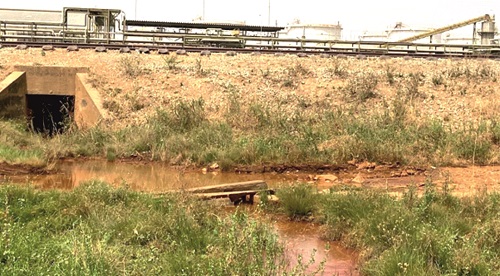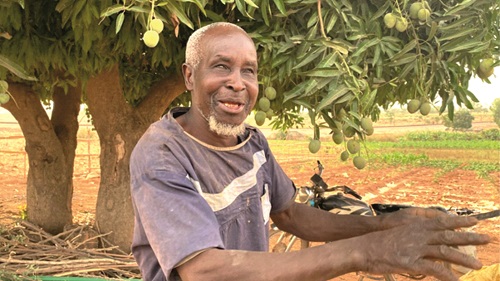As oil activities in Nigeria continue to take a heavy toll on human lives and the environment Investigative journalist Gabriel Ogunjobi in this third part of his report reveals the impact of oil spill from the moribund Kaduna refinery on farmlands and water source of two communities in Kaduna.
Sometimes , Garuba Usman’s face lights up and the smile that emerges is contagious. At other times, a reminder of his past shrinks his face, dampening the mood. The 70-year-old is one rare Fulani from Kaduna whose occupation is farming; he says he has never reared a single cow, the most common business of his kinsmen across Nigeria.
But farming, which Usman has done all his life , suddenly turned horrible last year. The reason, he said, was the oil spill from the refinery less than a kilometer away from his farmland.
He is one of the 15 farmers waiting to be compensated by the Kaduna Refining and Petrochemical Company (KRPC) for the spill which occurred a year ago.Although the Kaduna refinery, like others ,has been shut down since 2016 ,residents of the Kapam community in Kaduna believe the spilled oil was the residue content in pipelines that were left unattended to.
“The people gathered the names of farmers affected but to the best of my knowledge, none of them has been compensated,” says Joseph David, a youth leader in the community.
In the more than 40 years that Usman has lived in Kapam, he has raised a family and built a modest bungalow from the profits he made cultivating vegetables and crops like rice and cassava.
Before joining me under the mango tree in his farm that afternoon, he and his youngest son had ben pilling cassava streaks. Behind him were beds of vegetables germinating brightly in the scorching sunshine.
The farmer says he had, in 2021, his lowest harvest in most recent years. Ironically, he had high expectations not only for that year’s farming but also his family . One of such was the planned wedding of his son.When expected funds were not forthcoming, he went borrowing.
“I barely harvested five bags of rice last year,” he stated as his luminous gesture began to fade away.
During a good season, Usman said he could harvest up to 30 bags of rice from the large expanse of land.
Kaduna has been in a dire strait for several years now because of attacks by armed groups in the agrarian southern part of the state. In 2021 alone, no fewer than 1,192 lost their lives to banditry and other forms of violence in the state, while a total of 3,348 persons were kidnapped during the same period.
But it was the terrible condition of the refinery that brought about the worst woes to the two agrarian communities of Kapam and Rido flanking the KRPC. Usman epitomizes the parlous experience the people endure; it would later lead to a pent-up anger among the youths who felt cheated and attempted to protect their land rights.
When officials of the Kaduna State Vigilance Service (KADVIS) accompanied those of the State Urban Planning Development Agency (KASUDA) to demolish some houses on the borderline of the refinery, the people protested. The protest got out of hand when KADVIS personnel applied force, killing one of the protesters.

The community chairman and elder brother of the victim refused to speak on the incident but Adamu Alkali, another protester narrated how he survived to tell the story.
After the demolition of over 10 buildings on March 28, Alkali was thrown into a van belonging to KADVIS , and driven away, bloodied. “They left me for dead in one hospital,” he claimed, threatening a lawsuit against KASUDA, upon full recovery.
At the time he spoke, one of his eyes was bloodshot red, the other shut ; his occiput was bruised as the heavy-stomached man writhed in pain on a sofa chair.
KPRC denied sending KADVIS on the bloody operation demolition but the community said the management has a history of not taking responsibility for the action of its men.
ABANDONED WITH A PLAGUE
Rido is less than 3km off the Abuja-Kaduna expressway that has become frost by bandits in the last few years. Not only are the residents at the mercy of armed gang using forests as hideouts, they may have lost their source of portable water . No thanks to the refinery, says Jonathan David, who stays at the Railway Quarters within Rido.
The length and breadth of this community with more than 3000 inhabitants, according to the 2006 National Census, is by far remote and the road linking them to the federal highway in a terrible shape. As if to mysteriously preserve the unwholesome history of its existence, livelihood inside the Railway Quarters, on the exit wing of the community, is particularly squalid.
In January 1980, the borehole water system was launched alongside the government’s quarters built opposite the KPRC. When the minister of petroleum back inspected the housing project, he objected to the idea that people should reside there because of the environmental hazard the refinery would pose.
The remaining buildings were not completed but the Nigerian Railway Corporation took over the finished blocks for the temporary lodging of railway staff.
Today, over a hundred people — both NRC staff and non-staff — live there having to contend with a severe shortage of potable water.
“Each time there is an equipment failure or whatever, we see oil flowing out of the outlets into our farms,” the non-staff resident David, noted. “We started noticing traces of oil in our well.”
According to him, the borehole wasn’t working when he moved into the quarters in 2006. So, contaminated wells were their source of water.
A forensic research conducted on by the trio of Louis Buggu, Funmilayo Yusufu – Alfa and Abigail Abenu for the Ghana Journal in 2020 found out that the streams and other sources of water linked to the Rido River were contaminated by discharged effluents.

his occiput was bruised as the heavy-stomached man writhes in pain on a sofa chair.
Ten water samples were collected and tested for Arsenic (As), Cadmium (Cd), Chromium (Cr), Copper (Cu), Iron (Fe), Lead (Pb), Manganese (Mn), Mercury (Hg), Nickel (Ni) and Zinc (Zn).
The results revealed that in the dry season, six heavy metals, namely As, Cd, Cu, Mn, Ni and Zn, presented mean values that were higher after the point of effluent discharge; while Cr, Fe and Pb had lower values and Hg was not detected.
In the wet season all the heavy metals tested, except Hg, increased in values after the point of effluent discharge. The values of As, Cd, Fe, Mn, Ni and Pb after the discharge point, in dry and wet seasons, were greater than the maximum tolerable limits set by the Standard Organisation of Nigeria (SON) and the World Health Organisation (WHO). The values recorded for Zn and Cu at both dry and wet seasons were below the limit set by the Standard Organisation of Nigeria (SON) and the World Health Organisation (WHO), but the value of Cr was lower than the maximum tolerable limit only in the dry season. The contamination of the river with heavy metals poses a grave danger to human health, as its water is used for diverse purposes.
The researchers recommended that the wastewater treatment plant of KRPC should be rehabilitated and the wastewater can be pre-treated before it is discharged into the river.
The two contaminated wells shutdown is about five meters from the outlet and the borehole is even closer. With the well abandoned, the major source of water is the borehole whose purity is also erratic.
The other source is at a distance at the refinery military lodge off the rail link. They are not the only people depending on the tank. A neighboring Ungwan Bulus fetches there too. Bulus was in the news on March 31. It was attacked two days after the March train hijack.
A railway staff, who doesn’t want to be named says: “we are abandoned here,” bemoaning risks to their lives by the water they drink, yet the marauding bandits in their forest.
Garba Deen Muhammad, the NNPC spokesman didn’t answer calls to his line for interview over the contamination of Kaduna communities by the refinery.
With Nigeria’s regulatory failure on oil refineries, the nation’s old heritages — farming and fishing — are at a low ebb. The lack of environmental remediation across parts of Nigeria where oil is either explored or refined, has advanced the advocacy to halt oil processing in the country. Whilst the government is yet to be accountable for the ripple effects of crude oil, communities on the fencelines of refineries suffer for these. There are peculiar instances of sea surge and difficulty for fishing in Lagos with aquatic splendor. Across the Niger Delta, the overwhelming menace is the lack of standard environmental clean-up, sometimes leading to sudden or steady deaths while Kaduna communities, already ravaged of insurgence, reeks of soil and groundwater contamination.
- This report was funded under Health of Mother Earth Foundation’s fossil politics programme.


